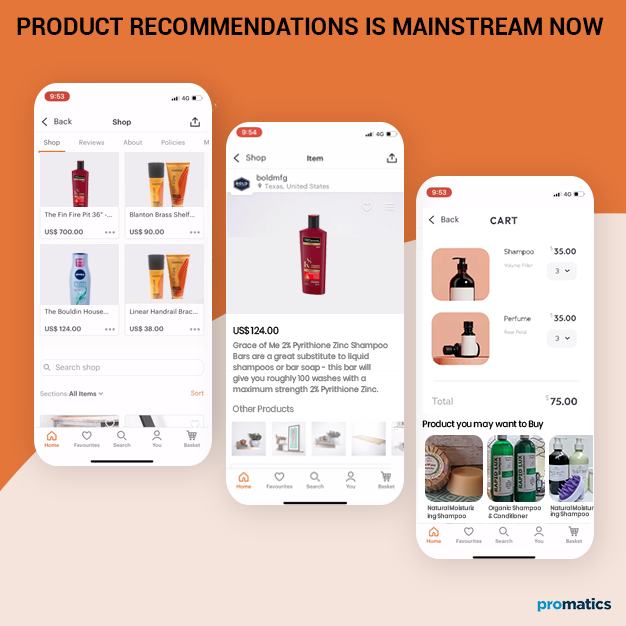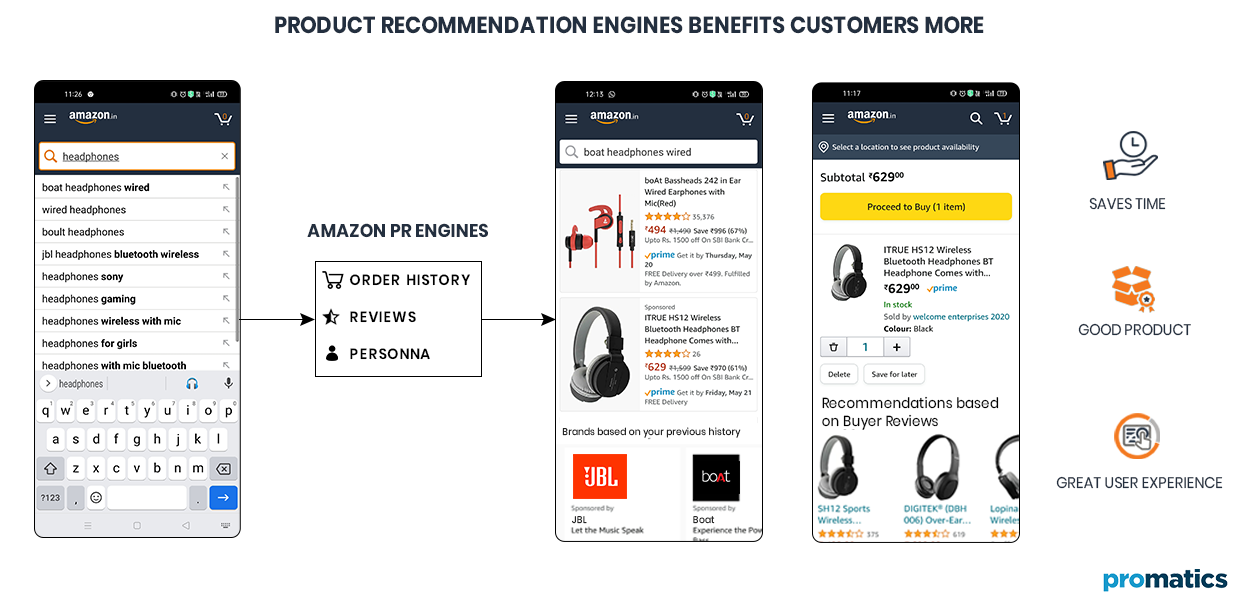All about Product Recommendation Engines: How they can Amp Up your e-commerce Store Sales?
I wonder how Amazon always gets the bits of ‘what I want to buy’ always right. Actually, that turns out to be bad for me that I end up buying more than what I should and eventually am out of budget for other things.
But thinking about it from Amazon’s perspective, if you are ‘Mr. Jeovani’s Glasses’ online store, you probably need to do the same thing to improve your profits. This is precisely what we will be discussing today.
All large e-commerce platforms use a thing called ‘product recommendation engine’ in collaboration with their website and user information database to present useful in front of the customer.
Product recommendation what?
Product recommendation engines are precisely AI-based algorithms that pick out products from their store and present it to the user considering his choice of what he might buy. This filtering can be based on relevant data like ‘what other user’s have bought with a particular product’ or ‘what drink do users like generally with their burger (which is 9/10 times, not coffee)’.
Product recommendation engines are tried and tested components of any online business that can make a huge difference in their sales and eventually profits. Not only e-commerce platforms like Amazon and eBay, but other sites like Spotify or Google Play Store, or even Netflix also use product recommendation engines. All of these platforms need one common thing from the user; his/her attention which they can convert into a profit.
You are someone who listens to Spotify on the way home. Now Spotify wants your attention that you listen to it after you get home as well. It is an attention seeker.
It creates a playlist of your favorite band (that you simply can not resist) and here you are, air pods glued into your ears as you eat dinner until the moment you have no choice but to go to sleep.
Types of Product recommendation engines
This was all accomplished by the product recommendation engine that analyzed your behavior towards a certain brand, your history of listened, liked, and skipped songs, and a comparison with what other fans of the band have done with their choices. Eventually, you end up with a playlist born for you.
We just discussed two different types of techniques that product recommendation engines use to come up with intelligent options.
1. Content-based filtering
Content-based filtering involves analyzing information about your likes and dislikes in the past, your attention span after seeing a particular product, and then mapping it key things with other products on the platform.
For example, you like genuine leather and bought a raw leather wallet last week. Using this information, the product recommendation engine will guess that you might like a leather belt as well. It will recommend it to you based on your personal history with the e-commerce website.
2. Collaborative Filtering
In collaborative filtering, the algorithm combines people into different groups based upon their interaction with the platform and then uses their common information to induce behavior that might not be common but is plausible.
For example, the last 10 people buying an iPhone 12 bought some sort of a wireless charger as well (or they figured out one the phone was delivered that Apple does not give you a charger in the box and then ordered a wireless charger shortly afterward). Now when I go to buy an iPhone, the algorithm will show me wireless chargers as well based on information from other iPhone buying accounts.
3. Hybrid Filtering
Hybrid filtering is a combination of both collaborative and content-based filtering that uses the advantages of both types of filtering.
In hybrid filtering, the algorithm analyzes the interests and behavior of the user and prepares recommendations based on not only his personalized behavior history but also the activities of other similarly behaving accounts.
Just like how we discussed in our example of Spotify recommendations; they are built using two things; your likes and dislikes and likes and dislikes other fans of the same band.
Who do Product Recommendation engines benefit?
Product recommendation engines apparently seem to benefit only the e-commerce platform that is trying to upsell its products but it is not the case.
Think about Amazon. You can see 350 million products on the platform being sold by different people and of different variations. As a person who is just trying to buy cereal for the upcoming Monday morning, how are you going to navigate through such a humungous volume?
You will search cereal and get probably some 900,000 results. That is nuts if you would even think of seeing more than 5 products just to buy a cereal box, right? This is where bring the product recommendation engine into the equation.
The algorithm analyses your behavior over the last month that you are buying cereal every 3 days. Now when you got to buy one this weekend, it will recommend that you buy a combo pack of 5 and get a discount of $3 and will show your favorite flavors and brands right away.
Your life just became easier and so will be the case every time you buy any product. Marketplace recommendations are not just based on your behavior, they are also fueled by previous buyer reviews and recommendations. The engine automatically recommends products with positive responses and thus, helps the righteous seller sell products and discourage the fakes and frauds.
So, what did the buyer get?
a.) A good quality product with the confidence of some 10-15 previous buyers
b.) A convenient buying experience that did not take up his entire day’s energy in just buying cereal
c.) Saved his time for some more important task
What did the seller get?
a.) Sale based on the quality of his product
b.) Promotion just because he/she is faithful and delivers what he/she shows
What did the marketplace get?
a.) Confidence that this website sells good quality products
b.) More money because the more each seller sells, the more commission the marketplace will earn
c.) It automatically discouraged a person poor quality product and saved its reputation
I think it is a win-win for everyone.
Benefits of Product recommendation engines
Product recommendation engines might sound creepy to some because one may feel that they are trying to predict human behavior and are a threat to mankind (just like any other thing associated with artificial intelligence) but they are not.
For your satisfaction, human beings are such complex beings that they are not just a combination of 0s and 1s that an algorithm can understand and mimic very easily. Every person is unique and has his own thought process based on his experiences and it is simply not possible to completely understand even a single person and his choices so no. AI is not a threat to human existence, not today and most probably not even in its more evolved form.
Each one of us is special and we make our decisions in our own unique ways.
Note that it is out of the air, let’s focus on the benefits that product recommendation engines provide us:
A.) Personalized experience
As discussed earlier, a product recommendation engine helps to tailor the buying experience to each individual buyer’s needs. This not only helps to provide greater satisfaction to the buyer on his choices but also allows him to make the right choices because it is already recommending the right product to the user.
B.) Improve Sales
All marketplace algorithms revolve around customer satisfaction. Your product has positive reviews and you deliver what you promise, the algorithm will automatically promote your product and help to boost your sales.
Apart from this, these recommendation engines also make up a vital part of the marketing find methodology of these websites. As a seller on Amazon, you might opt for paid promotion of your product.
If you sell wireless chargers, your product might show up to the person buying iPhone. Think about it, the buyer is getting a relevant product and your paid promotion is being shown in the right place to convent efficiently.
3. Improve the basket size
Basket size is also an important metric in an online marketplace. The average value of basket size in southeast Asia is increasing slowly over the past years. Say, 2 stores on an e-commerce marketplace are getting the same traffic and are converting in the same percentage. However, one of them gets an average basket size of $60 and the other has an average basket size of $90.
Both of them get 5 orders a day but the store with greater basket size is likely to make more profits. Although it is getting the same conversion rate, its conversion is 1.5 times valuable than the store with a $60 basket size. Spend the same and earn more.
What should your Product Recommendation engine have?
For you as an e-commerce store, it is important for you to incorporate a product recommendation engine onto your platform. However, you must pay proper attention and consideration to the infrastructure and processing of the AI-based algorithm.
1. Relevance
Keep in mind that you are trying to improve the customer’s experience and by no means want to annoy him. It is important that the algorithm recommends products that are relevant to the person.
As a simple example, a person who uses an iPhone will not be interested in a samsung charger or a guy will not be interested in lipstick and eyelashes. It would be just a waste of time and resources.
2. Novelty
If a person gets shown by the same product over and over, he will eventually get bored and irritated. Instead, if he comes across something unique, say a person who bought a table is shown a unique pen holder, it is more likely that he will buy it.
So, showing unique products is important that grasps the user’s attention and thus, the users are more prone to convert.
3. Diversity
Think of diversity as something more human. A person who searched for electronic products does not necessarily mean he will want to buy a cable or a charger each time he opens the app, right?
He/she is a normal human being and needs other things as well. The products recommended to him/her should have a balance between the two and therefore, it is important that your algorithm has all of these considerations worked out beforehand.
In the nutshell…
Product recommendation engines when configured correctly will be a valuable addition to your online business. They not only make things easy for the buyer but also help highlight promising products with good reviews and demand to make better profits.
Still have your concerns?
Your concerns are legit, and we know how to deal with them. Hook us up for a discussion, no strings attached, and we will show how we can add value to your operations!



